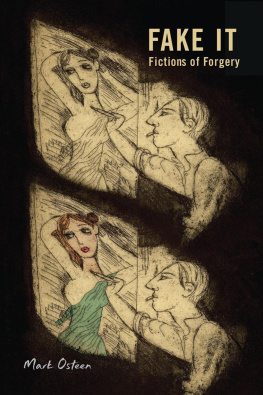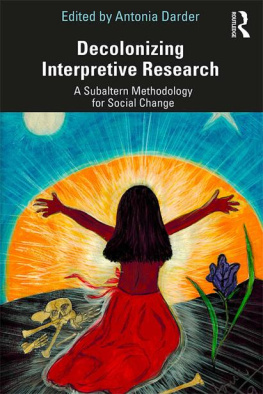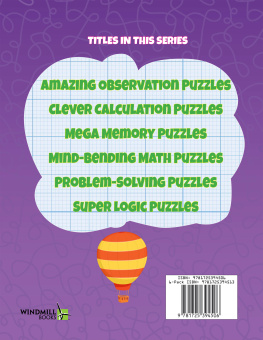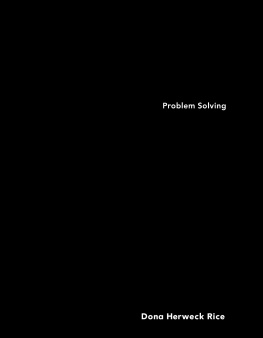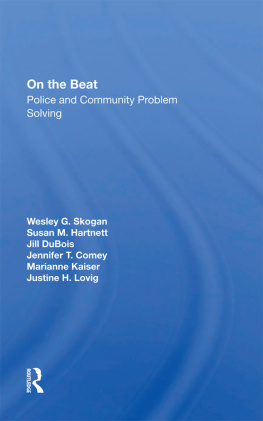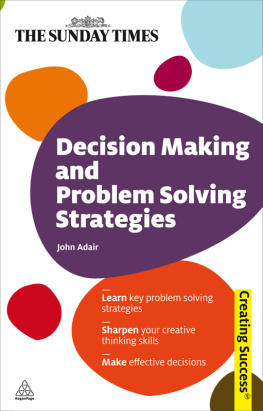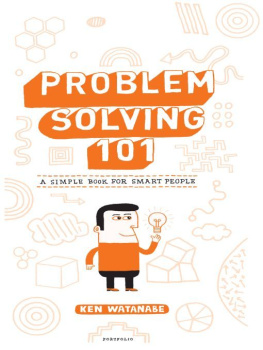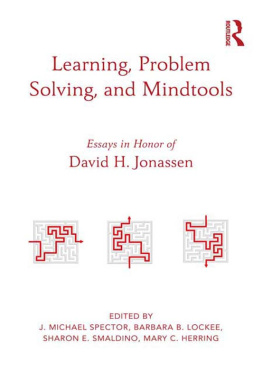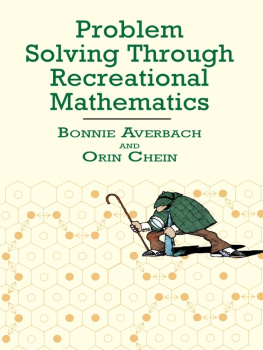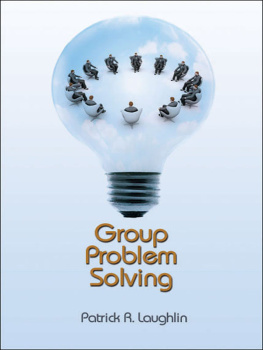Unknown - A New Synthesis for Solving the Problem of Psychology
Here you can read online Unknown - A New Synthesis for Solving the Problem of Psychology full text of the book (entire story) in english for free. Download pdf and epub, get meaning, cover and reviews about this ebook. year: 2022, genre: Religion. Description of the work, (preface) as well as reviews are available. Best literature library LitArk.com created for fans of good reading and offers a wide selection of genres:
Romance novel
Science fiction
Adventure
Detective
Science
History
Home and family
Prose
Art
Politics
Computer
Non-fiction
Religion
Business
Children
Humor
Choose a favorite category and find really read worthwhile books. Enjoy immersion in the world of imagination, feel the emotions of the characters or learn something new for yourself, make an fascinating discovery.

A New Synthesis for Solving the Problem of Psychology: summary, description and annotation
We offer to read an annotation, description, summary or preface (depends on what the author of the book "A New Synthesis for Solving the Problem of Psychology" wrote himself). If you haven't found the necessary information about the book — write in the comments, we will try to find it.
Unknown: author's other books
Who wrote A New Synthesis for Solving the Problem of Psychology? Find out the surname, the name of the author of the book and a list of all author's works by series.
A New Synthesis for Solving the Problem of Psychology — read online for free the complete book (whole text) full work
Below is the text of the book, divided by pages. System saving the place of the last page read, allows you to conveniently read the book "A New Synthesis for Solving the Problem of Psychology" online for free, without having to search again every time where you left off. Put a bookmark, and you can go to the page where you finished reading at any time.
Font size:
Interval:
Bookmark:

PALGRAVE STUDIES IN THE THEORY AND
HISTORY OF PSYCHOLOGY
A New Synthesis
for Solving the Problem
of Psychology
Addressing
the Enlightenment Gap
Gregg Henriques
Palgrave Studies in the Theory and History
of Psychology
Series Editor
Thomas Teo
Department of Psychology
York University
Toronto, ON, Canada
Palgrave Studies in the Theory and History of Psychology publishes scholarly books that draw on critical histories and theoretical concepts and methods, from a variety of approaches in the psychological humanities, to examine the discipline, profession, and practice of psychology.
This series publishes scholarly books that use historical and theoretical methods to critically examine the historical development and contemporary status of psychological concepts, methods, research, theories, and interventions. Books in this series are characterised by one, or a combination of, the following: (a) an emphasis on the concrete particulars of psychologists scientific and professional practices, together with a critical examination of the assumptions that attend their use; (b) expanding the horizon of the discipline to include more interdisciplinary and transdisci-plinary work performed by researchers and practitioners inside and outside of the discipline, increasing the knowledge created by the psychological humanities; (c) doing justice to the persons, communities, marginalized and oppressed people, or to academic ideas such as science or objectivity, or to critical concepts such social justice, resistance, agency, power, and democratic research. These examinations are anchored in clear, accessible descriptions of what psychologists do and believe about their activities. All the books in the series share the aim of advancing the scientific and professional practices of psychology and psychologists, even as they offer prob-ing and detailed questioning and critical reconstructions of these practices.
The series welcomes proposals for edited and authored works, in the form of full-length or short monographs; contact beth.farrow@palgrave.com for further information.
Series Editor:
Thomas Teo is Professor of Psychology at York University, Canada Series Editorial Board:
Lisa M. Osbeck, University of West Georgia, USA
Annette Mlberger, University of Groningen, the Netherlands
Alex Gillespie, London School of Economics and Political Science, UK
Alexandra Rutherford, York University, Canada
Suzanne R. Kirschner, College of the Holy Cross, USA
Ernst Schraube, Roskilde University, Denmark
Antonia Larrain, Universidad Alberto Hurtado, Chile
Wahbie Long, University of Cape Town, South Africa.
Gregg Henriques
A New Synthesis for
Solving the Problem
of Psychology
Addressing the Enlightenment Gap
Gregg Henriques
James Madison University
Harrisonburg, VA, USA
Palgrave Studies in the Theory and History of Psychology
ISBN
978-3-031-18492-5 ISBN
978-3-031-18493-2 (eBook)
https://doi.org/10.1007/978-3-031-18493-2
The Editor(s) (if applicable) and The Author(s), under exclusive licence to Springer Nature Switzerland AG 2022
This work is subject to copyright. All rights are solely and exclusively licensed by the Publisher, whether the whole or part of the material is concerned, specifically the rights of translation, reprinting, reuse of illustrations, recitation, broadcasting, reproduction on microfilms or in any other physical way, and transmission or information storage and retrieval, electronic adaptation, computer software, or by similar or dissimilar methodology now known or hereafter developed.
The use of general descriptive names, registered names, trademarks, service marks, etc. in this publication does not imply, even in the absence of a specific statement, that such names are exempt from the relevant protective laws and regulations and therefore free for general use.
The publisher, the authors, and the editors are safe to assume that the advice and information in this book are believed to be true and accurate at the date of publication. Neither the publisher nor the authors or the editors give a warranty, expressed or implied, with respect to the material contained herein or for any errors or omissions that may have been made. The publisher remains neutral with regard to jurisdictional claims in published maps and institutional affiliations.
This Palgrave Macmillan imprint is published by the registered company Springer Nature Switzerland AG.
The registered company address is: Gewerbestrasse 11, 6330 Cham, Switzerland
Praise for A New Synthesis for Solving
the Problem of Psychology
This integrative masterpiece exemplifies the best of cognitive science. It pursues a synoptic integration of many different literatures to generate a new, highly plausible framework for understanding the mind. Henriques is a modern Aristotle whose overarching vision is not only cogently and rigorously argued, but it also affords a conceptual vocabulary and theoretical grammar for the scientifically grounded practice of psychotherapy and the existential understanding of the human condition needed to address the current meaning crisis. This book should be required reading for any undergraduate psychology program, and it should be studied and discussed in depth within graduate programs. The field of psychology needs to be transformed in a way that can address both its internal problems and the external problems of mind and mental health facing the world today. Henriques
book does this masterfully.
John Vervaeke, Ph.D., Associate Professor of Cognitive Science at the University of Toronto, Canada, and author of Awakening from theMeaning Crisis
We live in an age that requires a new and better vision of what psychology is and can be, which is to say that today we need a new metapsychology. Gregg Henriques offers one of the most comprehensive and academically rigorous metapsychological visions available today. Moving across Big History, epistemology, and nearly every subfield of psychology, Henriques offers an impressive metamodern synthesis, and provocative cultural play. If this book has the reception it deserves, the field of psychology will never be the same.
Dr. Zak Stein, Co-Founder Civilizational Research Institute & Consilience Project, Co-President; Center for World Philosophy
and Religion, USA. Author of Education in a Time Between Worlds:Essays on the Future of Schools, Technology, and Society
A New Synthesis for Solving the Problem of Psychology is a dazzlingly ambitious attempt to close the gap between lawful objective and contextual interpersonal science; a gap left wanting since the advent of the Enlightenment. Through the promising voice of metamodernism along with synthetic elegance Henriques moves us toward a fuller, richer, and wiser psychological worldview.
Kirk J. Schneider, Ph.D., author of Existential-Integrative Psychotherapy,The Spirituality of Awe, and the forthcoming Life-EnhancingAnxiety: Key to a Sane World
Contents
Part I The Problem of Psychology
Part II The Unified Theory of Knowledge and Its First
Two Key Ideas
vii
viii CONTENTS
Part III A Descriptive Metaphysical System for Modern
Empirical Natural Science
Part IV Defining Behavior and Its Deep Connection to
Modern Science
Part V Defining Mental Processes and Grounding the
Next pageFont size:
Interval:
Bookmark:
Similar books «A New Synthesis for Solving the Problem of Psychology»
Look at similar books to A New Synthesis for Solving the Problem of Psychology. We have selected literature similar in name and meaning in the hope of providing readers with more options to find new, interesting, not yet read works.
Discussion, reviews of the book A New Synthesis for Solving the Problem of Psychology and just readers' own opinions. Leave your comments, write what you think about the work, its meaning or the main characters. Specify what exactly you liked and what you didn't like, and why you think so.


